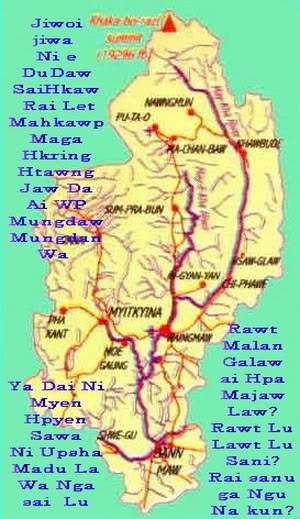By SAW YAN NAING
In a roundtable discussion held at Chiang Mai University in Thailand, representatives of Burma's ethnic groups who are living in exile agreed that the political landscape in Burma will not change in the wake of Burma's Nov. 7 general election because the 2008 Constitution grants no significant rights to ethnic groups.
“The 2008 constitution doesn’t protect and promote the right of ethnic nationalities,” said Kwe Hsay, an ethnic Karen who participated in the roundtable. “So how will the election be free and fair?”
The roundtable discussion, “Ethnic Perspective on the 2010 Election and Beyond,” was organized by the Thai Public Broadcasting Service and Burma Concern. It was attended by about 100 people.
Nang Charm Tong, an ethnic Shan activist and member of the Shan Women’s Action Network, said, “They [Burmese authorities] are only changing from a military uniform into a civilian uniform. Nothing will change politically after the election.”
“They are preparing for war,” she added.
A young ethnic Karen woman, Wah Khu Shee of the Karen Womens' Organization, agreed. She said that the military offensives and cases of murder, rape and torture against ethnic people, especially in eastern Burma, will continue after the election.
Eastern Burma is sometimes compared to Darfur due to the number of human rights abuses committed by the Burmese government troops against civilians. UN Special Rapporteur for human rights in Burma, Tomas Ojea Quintana, has recommended that the UN Security Council set up a Commission of Inquiry into war crimes and crimes against humanity that have taken place in the region.
“The election is intended to eliminate all armed ethnic groups,” said Lapai Naw Din, a Kachin representative who is also the editor of the Thailand-based Kachin News Group.
The ethnic representatives said there will be more migrant workers, refugees and internally displaced persons after the election because the Burmese regime is reportedly planning to clean up all ethnic armed groups, including ceasefire militias, who refused to transform their troops into members of the junta's border guard force, which would come under Burmese army control.
Some Burma observers have said the junta’s recent purchase of about 50 Mi-24 helicopters from Russia indicates that the regime is preparing for a post-election war against armed ethnic groups that control territories along Burma’s borders with China and Thailand.
Wah Khu Shee said that if the junta wants to show a positive sign of change in connection with the election, it should release Burmese democracy icon Aung San Suu Kyi and all other political prisoners.
Mi Aie Son, an ethnic Mon, said the election is not the solution for Burma's political conflicts and it will only legitimize the Burmese regime.
“That’s why we are boycotting the election and calling on the international community and all Burmese people to boycott the election,” said Mi Aie Son.
The ethnic representatives did agree, however, that a political dialogue that includes ethnic leaders, Burmese opposition leaders and the Burmese regime is necessary for positive change. Ethnic leaders have called for such dialogue for a long time, but the regime has ignored their calls, said the roundtable participants.
“If they [the Burmese regime] are willingly to talk, we are ready to talk,” said Wah Khu Shee.
Observers, however, believed the junta will not listen to ethnic demands and will continue with the election as planned.
Cheery Zahau, a Chin ethnic who also participated in the roundtable discussion, said the regime does not follow their own law. For example, Burmese generals, including Prime Minister Thein Sein, formed a political party to contest the election in violation of the Political Parties Registration Law.
Participants in the discussion also called for more pressure on the Burmese military regime from the international community and from Asian countries that invest heavily in Burma, such as China, India and members of the Association of Southeast Asian Nations.
Oct 29, 2010
Subscribe to:
Post Comments (Atom)
WUNPAWNG MUNGDAN SHANGLAWT HPUNG A NINGGAWN MUNGMASA
WUNPAWNG MUNGDAN SHANGLAWT HPUNG A NINGGAWN MUNGMASA
CHYE JU KABA SAI
Sa Du N'Gun Jaw La ai Majaw N'chying wa Chyeju Dum Ga ai,Yawng a Ntsa Wa Karai Kasang Kaw na N'Htum N'Wai ai Shaman Chye ju Tut e Hkam La Lu Nga mu Ga law




No comments:
Post a Comment